Ministry of Housing & Urban Affairs
Urban Areas of 35 states / UTs ODF - 4,167 cities certified ODF through Third Party Verification
About 66 Lakh Individual Household Toilets constructed against Mission Target of 59 Lakh
Around 5.9 Lakh seats of Community / Public Toilets constructed against Mission Target of 5.08 Lakh seats
819 Cities certified ODF+ & 312 cities ODF++
2,300 cities upload more than 57000 PTs mapped on Google Maps, covering more than 50% of India’s Urban Population
96% of Wards have door to door collection & approx. 60% of total waste generated is being processed
4 Cities (Indore, Ambikapur, Navi Mumbai and Mysuru) certified as 5-star cities, 57 cities as 3-star cities & 4 cities certified as 1-star cities
Partnership with NHAI to identify 1,500 points where plastic waste can be used for road construction
Swachhata hi Seva campaign of 2019 garners participation from more than 7 Crore Urban Residents, across 3200 Cities, from more than 1,06,000 Events & more than 7700 MT of plastic waste collected
SBM-u to focus on holistic & sustainable sanitation through Faecal sludge management & 100% wastewater treatment & reuse
SS 2020 to be conducted between 4-31st January 2020
Under Solid Waste Management, mission to focus on strengthening source segregation, collection, transportation & processing
Mission to also emphasize on construction & waste management & scientific landfilling & dumpsite remediation
प्रविष्टि तिथि:
23 DEC 2019 4:48PM by PIB Delhi
Swachh Bharat Mission-Urban (SBM-U) has achieved its target of creating Urban India ODF. Urban areas of 35 states / UTs have become ODF[1]. In all, 4,320 cities (out of 4,372) have declared themselves ODF, of which 4,167 cities have been certified through third party verification. This has been achieved by the construction of nearly 65.81 lakh Individual Household Toilets against Mission target of 59 lakhs and 5.89 lakh seats of community / public toilets against Mission target of 5.08 lakh seats under the Mission.
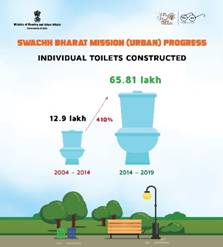
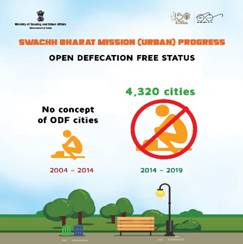
MoHUA has launched the ODF+ and ODF++ protocols, with a focus on sustaining ODF outcomes and achieving holistic sanitation. While ODF+ protocol focuses on O&M of community / public toilets by ensuring functionality and proper maintenance of CT/PTs for their continued usage, ODF++ focuses on addressing safe management of faecal sludge from toilets and ensuring that no untreated sludge is discharged into open drains, water bodies or in the open. Till date,819 cities have been certified ODF+, and 312 cities have been certified ODF++.
Recently, MoHUA has introduced the Water + protocol, designed to ensure that no untreated waste water is discharged into the open environment or water bodies.
MoHUA has partnered with Google to map all public toilets on Google maps, thereby improving ease of access of sanitation facilities to citizens. Till date, 2,300 cities have uploaded more than 57, 000 PTs mapped on Google maps, covering more than 50% of India’s urban population. The achievements of the Mission are detailed as below-
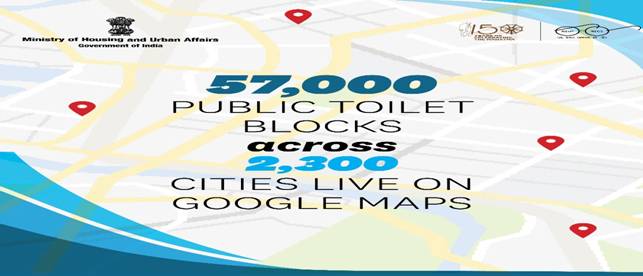
Solid Waste Management
- As on date, 96% of wards have door to door collection, and approx. 60% of the total waste generated is being processed.
- MoHUA also launched the Star rating protocol for Garbage free cities which is based on 12 parameters follows a SMART framework – Single metric, Measurable, Achievable, Rigorous verification mechanism and Targeted towards outcomes – and has been devised in a holistic manner including components such as cleanliness of drains & water bodies, plastic waste management, managing construction & demolition waste, etc. which are critical drivers for achieving garbage free cities. As on date, 4 cities (Indore, Ambikapur, Navi Mumbai and Mysuru) have been certified as 5-star cities, 57 cities have been certified as 3-star cities, and 4 cities have been certified as 1-star cities.
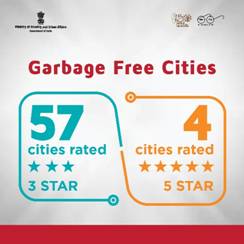
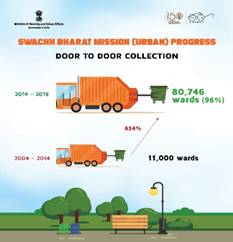
- Plastic Waste Management: The menace of plastic waste has now risen to alarming proportions. MOHUA, in line with the Plastics Management Rules, is working with other ministries and cities to recycle plastics and use them in road construction etc. MoHUA engaged with Cement Manufacturing Association to map 46 cement plants within 100 – 200 km from different ULBs, where plastic waste can be sent to CMA collection points and subsequently to cement plants for use as alternative fuel. MoHUA has also partnered with NHAI to identify 1,500 points where the plastic waste may be used for road construction. Additionally, cities have been asked to set up adequate Material Recovery Facilities (MRFs) to handle the segregation, processing and recycle of plastic waste.
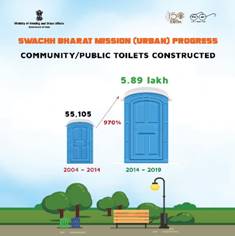
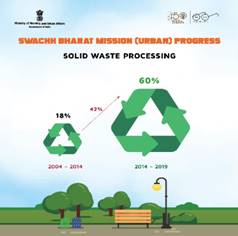
- The Swachhata hi Seva campaign of 2019 has garnered participation from more than 7 crore urban residents, across 3,200 cities, from more than 1,06,000 events, and more than 7,700 MT of plastic waste has been collected.
Swachh Surevkshan
- The Swachh Survekshan is an innovative survey conducted by the Ministry of Housing and Urban Affairs (MoHUA) under the Swachh Bharat Mission – Urban, to rank cities on various sanitation and cleanliness parameters. The survey has been successful in enthusing cities with a spirit of healthy competition towards the concept of ‘swachhata’.
- In its first round in 2016, the ‘Swachh Survekshan’ was conducted among 73 cities with population of 10 lakh and above, and state / UT capitals of India. In 2017, the survey was conducted among 434 cities. Swachh Survekshan 2018 covered 4,203 ULBs and SS 2019 covered 4,237 cities. The SS 2019 was unique in that the service level assessment was completely online and paperless.
- Today, this annual cleanliness survey impacts 43 crore urban citizens and is the largest urban sanitation survey in the world.
- For Swachh Survekshan 2020 (SS 2020) which was launched on 13th August 2019, MoHUA has introduced the concept of ‘continuous Survekshan’ to ensure that the Mission outcomes are sustained through a system of continuous monitoring and verification. Swachh Survekshan 2020 is scheduled to begin from 4 January 2020 and will continue till 31 January 2020.
Capacity Building:
Way Forward
- Going forward, Swachh Bharat Mission will focus on holistic and sustainable sanitation through faecal sludge management and 100% wastewater treatment and reuse.
- In the area of solid waste management, the Mission will focus on strengthening source segregation, collection, transportation and processing. Alongside, the Mission will also emphasize on construction and waste management and scientific landfilling and dumpsite remediation.
******
RJ/PS/MoHUA/YE2019/SBM/1
(रिलीज़ आईडी: 1597230)
आगंतुक पटल : 2212